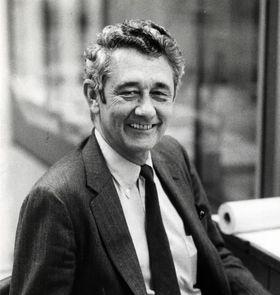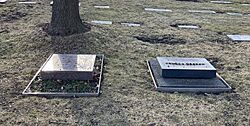Bruce Graham facts for kids
Quick facts for kids
Bruce Graham
|
|
|---|---|
 |
|
| Born |
Bruce John Graham
December 1, 1925 La Cumbre, Cauca Valley, Colombia
|
| Died | March 6, 2010 (aged 84) Hobe Sound, Florida U.S.
|
| Nationality | Peruvian-American |
| Alma mater | University of Pennsylvania School of Design Case Western Reserve University University of Dayton |
| Occupation | architect |
Bruce John Graham (December 1, 1925 – March 6, 2010) was a famous architect. He was born in Colombia and had Peruvian and American roots. Graham designed amazing buildings all over the world. He also helped shape the Burnham Plan of Chicago, which was a big plan for how the city of Chicago would grow.
Some of his most well-known buildings include the Inland Steel Building, the Willis Tower (which used to be called the Sears Tower), and the John Hancock Center. He also helped plan huge building projects in London, like Broadgate and Canary Wharf. People called him "the Burnham of his generation," comparing him to another great city planner.
Contents
Early Life and Education
Bruce Graham was born on December 1, 1925, in La Cumbre, Colombia. His father was a banker from Canada, and his mother was from Peru. Spanish was his first language.
He went to school in Puerto Rico and graduated in 1944. Later, he studied at the University of Dayton in Ohio. He also learned about structural engineering at the Case School of Applied Sciences in Cleveland, Ohio. In 1948, he earned his degree in Architecture from the University of Pennsylvania. After finishing his studies, he moved to Chicago. He first worked for a company called Holabird and Root. In 1951, he joined Skidmore, Owings and Merrill (SOM), which was the biggest architecture firm in the United States at the time.
A Career in Architecture
Bruce Graham worked at SOM for 40 years. During this time, he designed many famous buildings around the world. He worked on projects in Chicago, Guatemala, Hong Kong, London, Cairo, and many other cities.
He designed the Willis Tower, which was the tallest building in the world for nearly 36 years. He also designed the 100-story John Hancock Center and One Shell Plaza.
Graham was very involved with the University of Pennsylvania, especially its School of Fine Arts. He believed that architecture teachers should also be actively working as architects. He was very interested in the study of architectural ideas and even started the SOM Foundation. He also taught architecture at Harvard University.
Bruce Graham loved collecting art. He became friends with famous artists like Alexander Calder, Joan Miró, Chryssa, and Chillida. He invited these artists to create public artworks for the city of Chicago. Graham believed that to create great buildings, an architect should understand philosophy, history, music, and literature.
Graham's Design Ideas
Bruce Graham had studied structural engineering. This knowledge helped him design buildings that were not only beautiful but also very strong. He believed that the structure of a building could be part of its artistic look. The Hancock building is a great example of this, where its strong framework is also a key part of its design.
He later used these ideas in buildings like the Hotel Arts in Barcelona and his projects in London. Bruce Graham strongly believed that architecture, like dance and music, was a mix of structure and beauty. He thought these art forms showed the highest achievements of a culture. Graham also felt that architecture reflected the values of the society where it was built.
Projects in England
Bruce Graham had a big impact on the city of London. He was in charge of designing the main plans for two huge developments: Broadgate and Canary Wharf. He also designed nine other buildings in London.
Graham once said, "We design our buildings for the people who live or work in them. We also design them for those who see them from the street. We try to make buildings that fit in with London, not by copying old styles, but by creating something new."
-
Canary Wharf, view east from Cabot Square
Major Buildings Designed by Graham
Here are some of Bruce Graham's most important works:
- 1958 - Inland Steel Building, Chicago, Illinois, USA
- 1970 - John Hancock Center, Chicago, Illinois, USA
- 1973 - Sears Tower (renamed Willis Tower), Wacker Drive, Chicago, USA
- 1973 - First Wisconsin Plaza, Milwaukee, Wisconsin, USA
- 1982 - Broadgate, London, England
- 1988 - Canary Wharf, London, England
- 1992 - Hotel Arts, Barcelona, Spain
Later Life and Legacy
Bruce Graham passed away on March 6, 2010, at the age of 84. He died in Hobe Sound, Florida. He was buried at Graceland Cemetery in Chicago, next to another famous architect, Fazlur Rahman Khan.
On October 14, 2010, a street near the John Hancock Center in Chicago was named "Honorary Bruce J. Graham Way." This was done to honor him and his amazing work on one of Chicago's most famous buildings. The street runs along Chestnut Street and Mies van der Rohe Street.
See also
 In Spanish: Bruce Graham para niños
In Spanish: Bruce Graham para niños
- BMA Tower in Kansas City, Missouri
- Srinivasa 'Hal' Iyengar
 | Madam C. J. Walker |
 | Janet Emerson Bashen |
 | Annie Turnbo Malone |
 | Maggie L. Walker |








